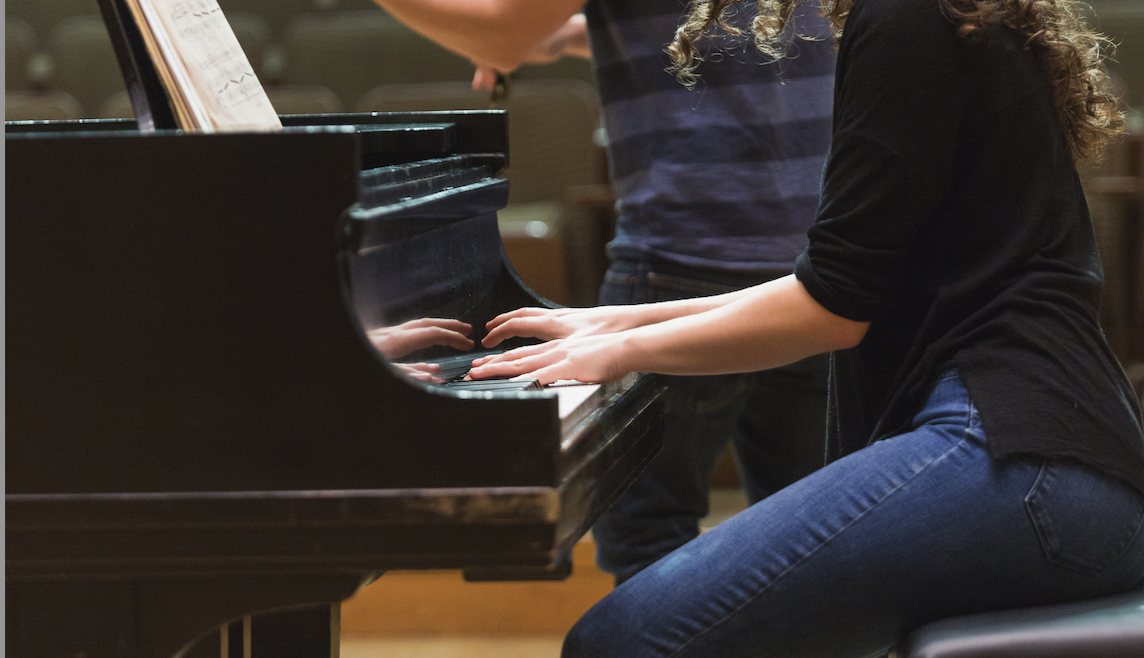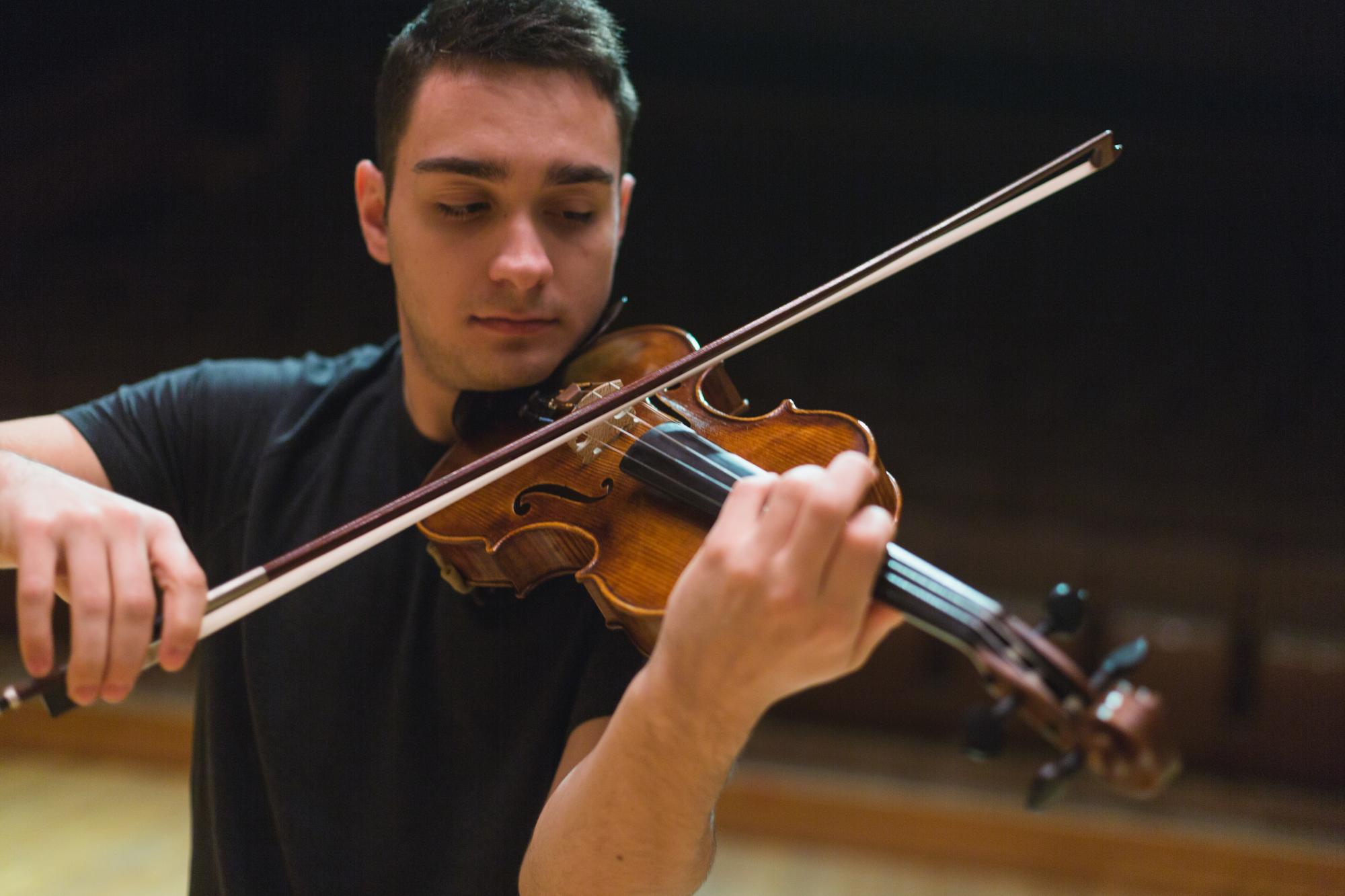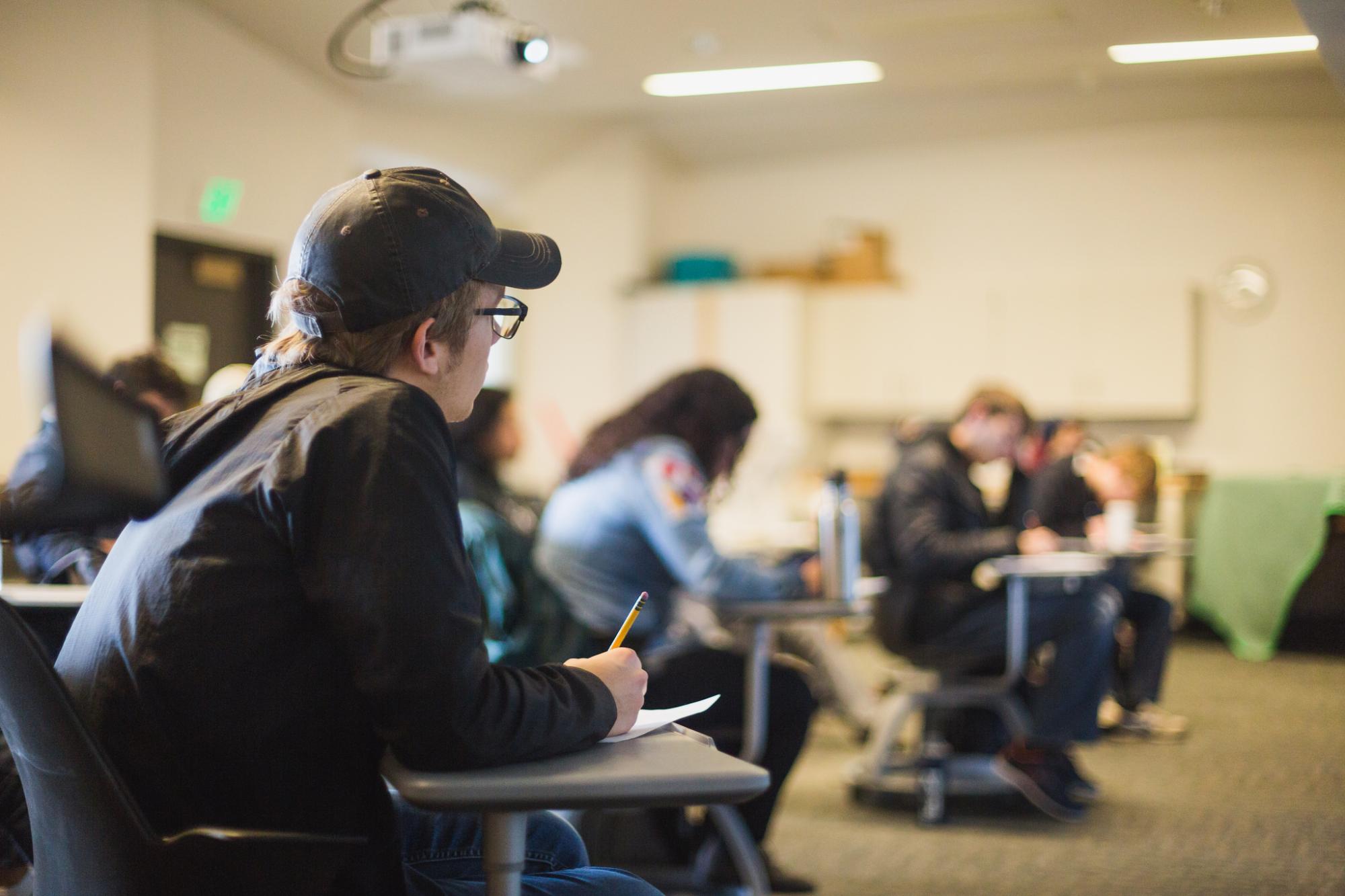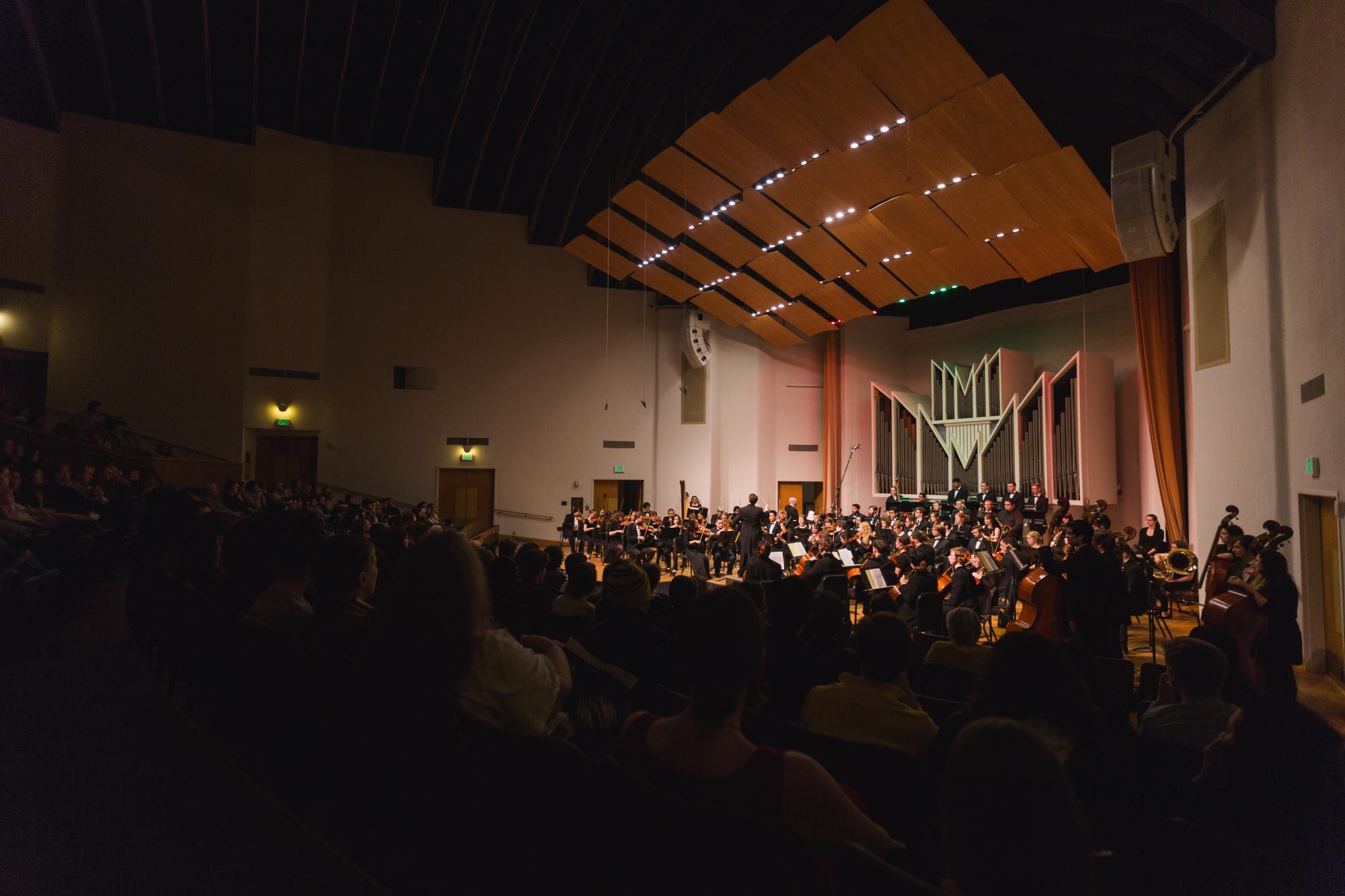Prospective Music Students

Welcome prospective undergraduate music students! Here, you'll find introductory information about our program, including programs of study, transfer credits and assessments, FAQs, and links for further exploration.
Prospective graduate students, please visit the Master of Music page.
Current music students are encouraged to navigate to the Current Music Students page.
Jump Links
Navigate to items on this page.
Why Study Music?
- Creativity and Innovation: Encourages unique expression, out-of-the-box thinking.
- Multicultural Understanding: Enhances understanding/introduces different cultures and traditions.
- Well-Being: Provides relaxation, stress relief, and emotional benefits.
- Emotional Intelligence: Fosters empathy, self-awareness, and expression of emotions.
- Perseverance and Discipline: Cultivates patience, goal-setting, and overcoming challenges.
- Cognitive Skills: Improves memory, attention, problem-solving, and pattern recognition.
- Engagement and Collaboration: Promotes teamwork and communication
- Career Opportunities: Performing, teaching, composing, research, therapy, and more.
How to Study Music
To study music as a major or minor, students must first complete a Music Admission and Scholarship Audition. Prospective graduate/master's students should review the Master of Music page for information on their audition/application process.
All WWU students can study music through general survey classes, ensembles, and lessons. Explore Opportunities for all WWU Students.
Major/Minor Steps
- Complete a Music Admission and Scholarship Audition
- Receive audition results via email
- Receive overrides to enroll in restricted courses
Use the drop-downs below for an introduction to our core sequences and programs of study. Please note, students cannot enroll in core sequences or academic major coursework until being accepted through Music Admission auditions. Review our auditions processes. Explore opportunities for all WWU students.
Music Core Sequence
The music core sequence is comprised of music theory, aural skills (ear training), keyboarding skills (class piano), and music history courses. The beginning of the sequence is offered each year in the fall. Music theory, aural skills, and keyboarding skills are commonly referred to as the "Big Three." The Big Three are designed to be completed as a set each quarter unless tested out (through assessments) or do not meet the minimum requirement in one of the subjects. MUS 341 will count as 3 points of Writing Proficiency.
Sequence Track
Piano majors, minors, and those with ~8+ of private piano lessons will take the "C" Advanced Keyboarding Sequence, all other students will complete the "B" sequence.
All course numbers are offered by the Music Department (MUS). Students placed into the advanced keyboarding sequence (MUS 221C-225C) will not enroll in the 200-level "B" sequence keyboarding classes.
| Year | Fall | Winter | Spring |
|---|---|---|---|
|
1 |
|
|
|
|
2 |
|
|
|
|
3 |
|
|
|
The Minor in Music is a 30-credit program that can be completed in one year and does not have a specific concentration. The program includes core courses in music theory, aural skills, and keyboarding skills, as well as an introduction to different music genres and optional ensemble and private instruction. Music theory, aural skills, and keyboarding skills must be taken together.
All music majors and minors take the same first-year core sequence, and the minor cannot be combined with a BA in Music or BMus major. Students can audition for the minor after their first year and still graduate on time.
Explore the coursework for the Minor in Music.
Sample Schedule
A typical incoming music minor will have the following music schedule for their first quarter.
- Music Theory, 2 cr. (MUS 122)
- Aural Skills, 1 cr. (MUS 121A)
- Keyboarding Skills, 1 cr. (MUS 121B) OR Advanced Keyboarding Skills, 2 cr. (MUS 221C)
The 29-credit Jazz Studies minor is designed for music majors who have an interest in a higher level of jazz education performance. The jazz studies minor is open to all current Bachelor of Music and Bachelor of Arts in Music students. This minor consists of advanced jazz theory and improvisation, jazz history, private jazz lessons, and jazz arranging and composition. To declare, students should audition for jazz ensembles and then set up a meeting with the Jazz Area Coordinator, Kevin Woods to discuss their interests and permission to declare.
Bachelor of Arts in Music, General Music Studies
The Bachelor of Arts in Music (BA) is our music major without a concentration. It includes core courses in music theory, aural skills, and history, as well as private instruction and ensemble performance. With 60 credits, this program offers flexibility for students to pursue an additional major or minor. To being a music major, students must audition on their primary instrument or voice. Explore Music Auditions
The BA is designed to take two to three years to complete. Students can choose to take the second and third years of core sequences together to finish the major in less than three years. Note that students must earn a minimum of 180 credits, including 60 upper-division courses (300 and 400-level). Students with minimal or no transfer credits should expect to take at least 3.5 years to graduate with any bachelor's degree.
Sample Schedule
A typical incoming music major will have the following music schedule for their first quarter.
- MUS 122, Music Theory I (2 cr.)
- MUS 121A, Aural Skills I, (1 cr.)
- MUS 121B or MUS 221C, Keyboarding Skills I (1 cr.) or Advanced Keyboarding Skills I (2 cr.)
- MUS 200, Private "Applied" Lessons (1 or 2 cr.)
- MUS ###, Major Ensemble (2 cr.)
Bachelor of Music in Composition (BMus)
The BMus in Composition major (110+ cr.) is designed to provide students with private composition training, advanced music theory, music history, conducting, lesson, and ensemble performance experience. While composition instruction covers all modes, genres, and periods, students may elect to concentrate their creativity on one or more specific areas. The degree typically takes around four years to complete for an average incoming music student. Students who qualify for assessments may be able to finish sooner. Students who test out of core classes should still expect to take a minimum of 2.5-3 years to finish the total major.
Prospective composition majors must complete an audition on their primary instrument and submit a portfolio of previous work to be accepted as a major. Explore Music Auditions.
Sample Schedule
A typical incoming music major will have the following music schedule for their first quarter.
- MUS 122, Music Theory I (2 cr.)
- MUS 121A, Aural Skills I, (1 cr.)
- MUS 121B or MUS 221C, Keyboarding Skills I (1 cr.) or Advanced Keyboarding Skills I (2 cr.)
- MUS 200, Private "Applied" Lessons (1 or 2 cr.)
- MUS ###, Major Ensemble (2 cr.)
Bachelor of Music in Musicology (BMus)
The BMus in Musicology (110+ cr.) is ideal for students who are interested in musicology or ethnomusicology. In addition to the core sequences of music theory, music history, aural skills, and keyboarding skills, musicology majors concentrate their advanced work on musicology seminars and have the opportunity to take independent studies with our Musicology Coordinator. The degree usually takes approximately four years to complete for the average incoming Musicology major. Students who qualify for assessments may be able to finish sooner. To being a music major, students must audition on their primary instrument or voice. Explore Music Auditions
Sample Schedule
A typical incoming music major will have the following music schedule for their first quarter.
- MUS 122, Music Theory I (2 cr.)
- MUS 121A, Aural Skills I, (1 cr.)
- MUS 121B or MUS 221C, Keyboarding Skills I (1 cr.) or Advanced Keyboarding Skills I (2 cr.)
- MUS 200, Private "Applied" Lessons (1 or 2 cr.)
- MUS ###, Major Ensemble (2 cr.)
Bachelor of Music Education P-12 (BMus)
The BMus Education major (130+ cr.) is ideal for a student who wishes to teach music in the P-12 music classroom setting. This includes teaching general music, conducting choir/band/orchestra, and others. Students who finish this major, including the combined certification program, will graduate with certification to teach P-12 general/choral music and/or general/instrumental music. The program consists of a variety of pedagogy labs, conducting, and music education-specific courses, including a student internship at a public school. To being a music major, students must audition on their primary instrument or voice. Explore Music Auditions
This major is structured to take approximately 4.25-4.5 years to complete for the average incoming music student. Students who qualify for assessments may be able to finish sooner. Based on the sequence of classes, all academic coursework can be completed in four years, followed by 14 weeks (1 quarter) of full-time student teaching the following fall or winter quarter. The Music Education Coordinator will assist students in their application to the Woodring of College of Education to complete the combined P-12 certification, this typically takes place during the third year in the music major.
Sample Schedule
A typical incoming music major will have the following music schedule for their first quarter.
- MUS 122, Music Theory I (2 cr.)
- MUS 121A, Aural Skills I, (1 cr.)
- MUS 121B or MUS 221C, Keyboarding Skills I (1 cr.) or Advanced Keyboarding Skills I (2 cr.)
- MUS 200, Private "Applied" Lessons (1 or 2 cr.)
- MUS ###, Major Ensemble (2 cr.)
Bachelor of Music in Performance (BMus)
The BMus in Performance emphasizes high-level performance and pedagogy. Students receive comprehensive instruction on their primary instrument, gain a variety of solo and ensemble experiences, and perform two recitals in addition to completing a core set of courses in music theory, aural skills, keyboarding, and music history. The degree usually takes approximately four years to complete for the average incoming music student. However, students who qualify for assessments may be able to finish sooner. To being a music major, students must audition on their primary instrument or voice. Explore Music Auditions.
Sample Schedule
A typical incoming music major will have the following music schedule for their first quarter.
- MUS 122, Music Theory I (2 cr.)
- MUS 121A, Aural Skills I, (1 cr.)
- MUS 121B or MUS 221C, Keyboarding Skills I (1 cr.) or Advanced Keyboarding Skills I (2 cr.)
- MUS 200, Private "Applied" Lessons (1 or 2 cr.)
- MUS ###, Major Ensemble (2 cr.)
- Voice Performance Only: MUS 166A, Intro to Voice Studies (2 cr.)
Credits and Course Load
Reduced Credit for Music
Unlike most courses at WWU, music classes are historically reduced in credit hours. This adjustment typically allows students to enroll in General University Requirements (GURs) alongside their quarterly requirements in music. It is important to note that despite the reduced credits, music courses maintain a challenging workload equivalent to a 3-4 credit course. Due to the reduced credit load, students will typically not reach full-time status for financial aid (12 credits) with just required music courses.
Course Load
Music students typically have a larger course load per quarter than an average incoming WWU student. Music students are often taking one to two General University Requirements (GURs) alongside their quarterly requirements in music for several years.
We recommend that incoming freshman/running-start music majors take 12-14 credits in their first quarter to adjust to the core sequence courses. However, many students are successful with a large course load which is contingent on each student's experience and needs.
Music students typically take 12-18 credits per quarter, depending on factors such as their degree program, year in the music program, transfer credits, and general university requirements (GURs). Third and fourth-year students in Music Education should expect to take 14-18 credits for a quarter throughout their last two years.
Students will declare a music major or minor after being accepted through Music Admission and Scholarship Auditions. The Music Undergraduate Advisor will contact accepted students individually in mid-spring to early summer to complete the declaration process.
Transfer Credits
We directly accept transfer credits from ensembles, lessons, survey classes, and general music courses as the agreed transfer equivalency. While we directly accept credits, music majors must enroll and participate in lessons and ensembles at WWU regardless of previously completed credits.
Credits for music theory, aural skills, and keyboarding skills are initially transferred as general credits (1TT/1XX) until a music core equivalency assessment determines the appropriate equivalency.
Music Assessments
We offer two optional assessments based on transfer credit status with our core classes: music theory, aural skills, and keyboarding skills.
-
No Transfer Credit (First-Quarter Challenge Assessments). Students without transfer credit in our core classes are eligible for first-quarter challenge assessments in music theory and aural skills. During the first week of classes in MUS 122 and MUS 121A, students may take the online final early. Those who score high enough can drop the course and begin MUS 124 and/or MUS 123A in the winter quarter. Scoring low on this assessment has no consequences. Please, note that students will not earn credit for testing out of MUS 122 or MUS 121A and may need to make up those credits later under advisement.
-
Transfer Credit (Music Core Equivalency Assessments). Students with transfer credit in core sequence subjects are eligible to take the Music Core Equivalency Assessments. These assessments determine the transfer equivalency of music theory, aural skills (ear training), and keyboarding skills (class piano) and place students into our sequence. AP Music Theory students must earn a score of 3 or higher to be eligible for these assessments. Keyboarding assessments are only available to students with transfer credit in that subject from a college or university. To take the assessments, students need to provide proof of eligibility through AP test scores or unofficial transcripts.
Music Core Equivalency Assessment Details
Core Equivalency Assessments are offered to eligible students after accepted to the program as a major or minor and show proof of eligibility. Assessments are offered online in May and person in September the Monday before the fall term begins for incoming fall quarter students. Winter and spring entrants can schedule appointments with the undergraduate music advisor.
To prepare for the assessments, review the assessment guide alongside your previous institution's course materials or AP exam study guides. Please note that placement at the preferred level is not guaranteed, and some students may need to repeat courses previously taken at other institutions.
Core Equivalency Assessment Format
-
The music theory assessment is a timed (120 min) multiple-choice and written assessment. Students taking the assessment online must download and save the Music Theory Written Portion PDF, which must be uploaded as a scanned PDF or photo in the last question.
- The aural skills assessment is an individual 15-20 min appointment either on Zoom or in person. It includes sight singing, sight reading, and listening for intervals and harmonies.
- The keyboarding assessment has a prescreening portion via an online form where students can upload or describe their most recent course curriculum. After this, students may be required to schedule an individual in-person appointment for the Keyboard Proficiency Exam. During the assessment, eligible keyboarding assessment students will play what they can from the KPE, and the accompanied piece will be played at a later date.
Building Information
Advising and Degree Information
- Next Level Advising, Degree Planning, and Policies
- Full Music Major and Minor Requirements
- Full WWU Degree Requirements
Ensembles, Voice, Opera
No, a Music Admissions audition is required to start the core sequences and academic major/minor coursework. These classes include music theory, aural skills, and keyboarding skills, music education courses, composition courses, and music history courses.
All WWU students have access to music GURs (General University Requirement) (MUS 104-111, 202, 301, and 302), MUS 101, ensembles, applied lessons (a studio audition may be needed), and productions. Students that have not auditioned to be a Composition major may inquire about being added to the composition studio waitlist; contact Dr. Charlies Halka for more information.
Read more about music opportunities open to all WWU students.
Yes! Music students can double major with any degree outside of the department. Students who complete two majors are not necessarily awarded two diplomas or two degrees. If the two majors are the same degree type (B.A, BMus, BS, etc.) or overlap by more than 50% then one diploma is awarded and the second major is listed as completed in degree notes. Within the music department, students can complete multiple concentrations.
Students should be aware that scheduling conflicts are common when completing a double major. Students who decide to double major should plan to meet with each department advisor at least once a year to go over academic planning and coursework.
Earning an AA/DTA can assist music students by fulfilling general university requirements (GURs). However, earning an AA/DTA does not guarantee a student may graduate faster from any degree program.
Students must complete all major and general graduation requirements to earn a degree from WWU which may not include courses previously completed at another institution. In addition, music majors meet technical and music benchmarks in private lessons that cannot be determined through previous academic coursework. Students who are eligible for course equivalency assessments offered to accepted music majors and minors may be able to graduate faster depending on the results.
The Department of Music offers HUM or AGCM GURs during the summer. At this time, we do not offer core music classes, ensembles, or lessons during the summer quarter.
While students may perform musical theatre repertoire, our department does not offer a major or minor in musical theater. Students at WWU can study musical theater through the Department of Theatre & Dance. Please see the Theatre Concentrations page on the Department of Theatre & Dance website.
Students interested in these subjects are encouraged to look at the Audio Technology, Music, and Society Minor through WWU Fairhaven College. Fairhaven allows for interdisciplinary majors and boasts an excellent audio engineering program (with a professional studio), as well as other music classes including songwriting. While BMus Composition students may elect to take a course in computer or electroacoustic music, this is not the primary focus of the degree program.
Yes. Students must apply to WWU through the Admissions Office. Students can audition for our program at any time before or after submitting an admissions application. Students do not need to wait for WWU acceptance to audition. Please note, acceptance to the music major or minor does not guarantee admission to the general university. Students must eventually be accepted through the WWU Admissions Office to enroll as a music major or minor and it is possible for a student to be accepted to our major or minor and not be admitted through the WWU Admissions Office.
Students may enroll in Symphonic Band or University Choir any quarter without placement. The only exception is music majors, minors, and scholarship recipients who must complete an ensemble audition for placement. For all other ensembles, students will complete an Ensemble Audition.
All students must register for an ensemble to participate. The only exception is Viking Band, which is not offered as a course. Each course is repeatable for credit and may be used towards graduation requirements such as upper-division (300 and 400-level courses), electives, and the 180 credits required to graduate from WWU.
Questions or Concerns?
Please do not hesitate to contact us if you have any questions or concerns.
Department of Music
Performing Arts Center 273
Mailstop 9107
516 High Street
Bellingham, WA, 98225
(360) 650-3130
Music@wwu.edu




